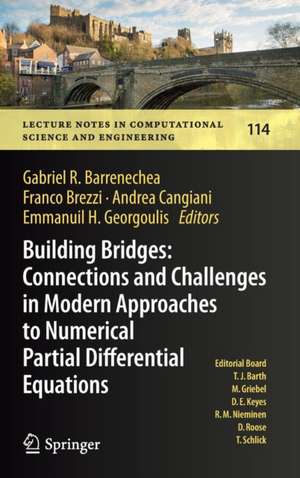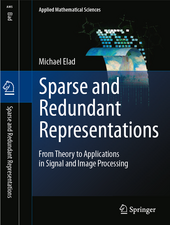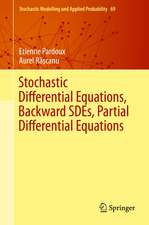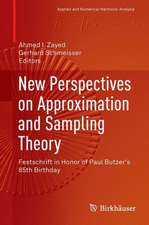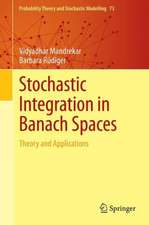Building Bridges: Connections and Challenges in Modern Approaches to Numerical Partial Differential Equations: Lecture Notes in Computational Science and Engineering, cartea 114
Editat de Gabriel R. Barrenechea, Franco Brezzi, Andrea Cangiani, Emmanuil H. Georgoulisen Limba Engleză Hardback – 4 oct 2016
This volume contains contributed survey papers from the main speakers at the LMS/EPSRC Symposium “Building bridges: connections and challenges in modern approaches to numerical partial differential equations”. This meeting took place in July 8-16, 2014, and its main purpose was to gather specialists in emerging areas of numerical PDEs, and explore the connections between the different approaches.
The type of contributions ranges from the theoretical foundations of these new techniques, to the applications of them, to new general frameworks and unified approaches that can cover one, or more than one, of these emerging techniques.
| Toate formatele și edițiile | Preț | Express |
|---|---|---|
| Paperback (1) | 648.05 lei 6-8 săpt. | |
| Springer International Publishing – 15 iun 2018 | 648.05 lei 6-8 săpt. | |
| Hardback (1) | 654.43 lei 6-8 săpt. | |
| Springer International Publishing – 4 oct 2016 | 654.43 lei 6-8 săpt. |
Din seria Lecture Notes in Computational Science and Engineering
-
 Preț: 375.63 lei
Preț: 375.63 lei - 18%
 Preț: 1247.70 lei
Preț: 1247.70 lei - 18%
 Preț: 787.15 lei
Preț: 787.15 lei -
 Preț: 384.31 lei
Preț: 384.31 lei - 20%
 Preț: 990.95 lei
Preț: 990.95 lei - 15%
 Preț: 648.56 lei
Preț: 648.56 lei - 15%
 Preț: 653.00 lei
Preț: 653.00 lei -
 Preț: 405.28 lei
Preț: 405.28 lei - 18%
 Preț: 976.06 lei
Preț: 976.06 lei - 18%
 Preț: 968.82 lei
Preț: 968.82 lei -
 Preț: 397.97 lei
Preț: 397.97 lei - 18%
 Preț: 962.49 lei
Preț: 962.49 lei - 15%
 Preț: 647.08 lei
Preț: 647.08 lei - 15%
 Preț: 648.56 lei
Preț: 648.56 lei - 15%
 Preț: 649.54 lei
Preț: 649.54 lei - 18%
 Preț: 1389.30 lei
Preț: 1389.30 lei -
 Preț: 428.30 lei
Preț: 428.30 lei - 18%
 Preț: 1240.62 lei
Preț: 1240.62 lei - 20%
 Preț: 666.27 lei
Preț: 666.27 lei - 15%
 Preț: 644.30 lei
Preț: 644.30 lei - 18%
 Preț: 957.62 lei
Preț: 957.62 lei - 18%
 Preț: 1224.18 lei
Preț: 1224.18 lei - 18%
 Preț: 904.11 lei
Preț: 904.11 lei - 18%
 Preț: 1242.83 lei
Preț: 1242.83 lei - 20%
 Preț: 992.11 lei
Preț: 992.11 lei - 15%
 Preț: 642.83 lei
Preț: 642.83 lei - 18%
 Preț: 954.45 lei
Preț: 954.45 lei - 18%
 Preț: 783.20 lei
Preț: 783.20 lei - 18%
 Preț: 949.42 lei
Preț: 949.42 lei - 15%
 Preț: 642.83 lei
Preț: 642.83 lei - 18%
 Preț: 964.86 lei
Preț: 964.86 lei - 18%
 Preț: 1260.83 lei
Preț: 1260.83 lei - 15%
 Preț: 650.37 lei
Preț: 650.37 lei
Preț: 654.43 lei
Preț vechi: 769.92 lei
-15% Nou
Puncte Express: 982
Preț estimativ în valută:
125.23€ • 133.91$ • 104.41£
125.23€ • 133.91$ • 104.41£
Carte tipărită la comandă
Livrare economică 18 aprilie-02 mai
Preluare comenzi: 021 569.72.76
Specificații
ISBN-13: 9783319416380
ISBN-10: 3319416383
Pagini: 440
Ilustrații: VIII, 433 p. 40 illus., 21 illus. in color.
Dimensiuni: 155 x 235 x 25 mm
Greutate: 0.81 kg
Ediția:1st ed. 2016
Editura: Springer International Publishing
Colecția Springer
Seria Lecture Notes in Computational Science and Engineering
Locul publicării:Cham, Switzerland
ISBN-10: 3319416383
Pagini: 440
Ilustrații: VIII, 433 p. 40 illus., 21 illus. in color.
Dimensiuni: 155 x 235 x 25 mm
Greutate: 0.81 kg
Ediția:1st ed. 2016
Editura: Springer International Publishing
Colecția Springer
Seria Lecture Notes in Computational Science and Engineering
Locul publicării:Cham, Switzerland
Cuprins
Part I Introduction.- Gabriel R. Barrenechea, Franco Brezzi, Andrea Cangiani, Emmanuil H. Georgoulis: Building Bridges: Connections and Challenges in Modern Approaches to Numerical Partial Differential Equations.- Part II Invited Papers.- Assyr Abdulle: Numerical homogenization methods for parabolic monotone problems.- L. Beirao da Veiga, F. Brezzi, L.D. Marini, A. Russo: Virtual Element implementation for general elliptic equations.- Annalisa Bu_a, Eduardo M. Garau, Carlotta Giannelli, and Giancarlo Sangalli: On quasi-interpolation operators in spline spaces.- Erik Burman: Stabilised finite element methods for ill-posed problems with conditional stability.- Bernardo Cockburn: Static condensation, hybridization, and the devising of the HDG methods.- Truman Ellis, Jesse Chan, and Leszek Demkowicz: Robust DPG Methods for Transient Convection-Diffusion.- Daniele A. Di Pietro, Alexandre Ern, and Simon Lemaire: A review of Hybrid High-Order methods: formulations, computational aspects, comparison with other methods.- Ralf Hiptmair, Andrea Moiola and Ilaria Perugia: A Survey of Trefftz Methods for the Helmholtz Equation.- Paola F. Antonietti, Andrea Cangiani, Joe Collis, Zhaonan Dong, Emmanuil H. Georgoulis, Stefano Giani, and Paul Houston: Review of Discontinuous Galerkin Finite Element Methods for Partial Di_erential Equations on Complicated Domains.- Konstantin Lipnikov and Gianmarco Manzini: Discretization of mixed formulations of elliptic problems on polyhedral meshes.- Daniel Peterseim: Variational Multiscale Stabilization and the Exponential Decay of Fine-scale Correctors.- Chi-Wang Shu: Discontinuous Galerkin methods for time-dependent convection dominated problems: basics, recent developments and comparison with other methods.- Christopher Harder and Frédéric Valentin: Foundations of the MHM Method.
Textul de pe ultima copertă
This volume contains contributed survey papers from the main speakers at the LMS/EPSRC Symposium “Building bridges: connections and challenges in modern approaches to numerical partial differential equations”. This meeting took place in July 8-16, 2014, and its main purpose was to gather specialists in emerging areas of numerical PDEs, and explore the connections between the different approaches.
The type of contributions ranges from the theoretical foundations of these new techniques, to the applications of them, to new general frameworks and unified approaches that can cover one, or more than one, of these emerging techniques.
Caracteristici
The authors are the leading experts in the field. It is hard to find such a selected list of authors writing about the developments they are carrying out at present The main developments in recent approaches to numerical PDEs are gathered in this book The survey nature of each contribution makes the volume an ideal reading for practitioners, academics, as well as graduate students wishing to grasp the fundamental aspect of modern numerical PDE approaches
